Can you tattoo over a bruise? This is a question that many people ask, and the answer is not always straightforward. In this article, we will explore the topic of tattooing over bruises in detail. We will look at the reasons why you might want to do this, as well as the potential risks and complications involved. So, can you tattoo over a bruise? The answer is…it depends! Keep reading to learn more.
What You Should Know About Bruises and Tattoos
Bruises are fairly common, and most people will experience them at some point in their lives. They occur when small blood vessels are damaged, causing the blood to leak out into the surrounding tissue. This can happen due to a variety of reasons, including trauma, surgery, or even just rubbing or scratching the skin too hard. Bruises usually appear as a dark blue or purple mark on the skin, and they can be painful. However, they typically heal within a few days to a week without any treatment.
Tattoos are created by injecting ink into the skin using needles. This process can also cause some bruising, but it is usually minimal and goes away within a few days.So, can you tattoo over a bruise? The answer is that it depends on the severity of the bruise. If the bruise is small and not too deep, then it should be safe to tattoo over it. However, if the bruise is large or deep, then it is not recommended to tattoo over it. This is because the ink could cause further damage to the blood vessels and delay healing. In addition, tattoos are more likely to become infected if they are done over bruised skin. [1]
Painful Tattoo Application
One of the main reasons why people want to tattoo over a bruise is because they think it will be less painful. This is because the skin is already damaged and therefore more resistant to pain. However, this is not always the case. In fact, some people find that tattooing over a bruise can actually be more painful than if the bruise was not there. This is because the needle can cause further damage to the blood vessels, which can be quite painful. If you are considering tattooing over a bruise, it is important to weigh the pros and cons carefully before making a decision.
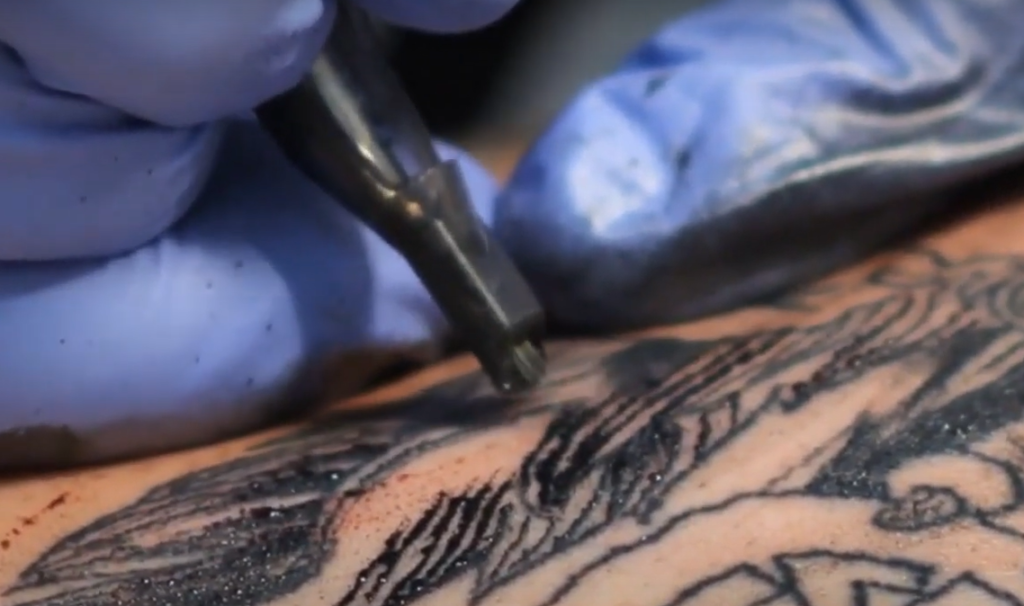
While it is possible to tattoo over a bruise, there are some risks involved. There is a higher risk of infection when tattoos are done over bruised skin. In addition, the tattoo may not heal properly or may even become infected. If you are considering tattooing over a bruise, it is important to consult with a professional tattoo artist beforehand to discuss the risks and potential complications involved. [2]
Healing Process
Another thing to consider before tattooing over a bruise is the healing process. It can take up to several weeks for a tattoo to heal properly. During this time, it is important to keep the area clean and dry to prevent infection. If you have a large or deep bruise, it may take longer for the area to heal properly. In addition, the tattoo may not look as good as it would if it was done on healthy skin.
Tattooing over a bruise is not recommended by most professional tattoo artists. This is because of the risks involved, including infection and delayed healing. If you are considering doing this, it is important to consult with a professional beforehand and weigh the pros and cons carefully.
What is a tattoo blowout?
Tattoo blowout is a relatively common tattoo complication that can occur when the ink is injected too deep into the skin. This can cause the ink to spread out under the skin, resulting in a blurry and distorted tattoo. Tattoo blowouts are more likely to occur when tattoos are done over bruised or damaged skin. If you are considering tattooing over a bruise, it is important to be aware of this potential complication.
While tattooing over a bruise is not recommended, there are some situations where it may be necessary. For example, if you have a large bruise that needs to be covered up for an event or surgery, tattooing over it may be your only option. In addition, some people choose to tattoo over bruises because they feel it is less painful than getting a tattoo on healthy skin.
How do I get rid of a bruise on my tattoo?
If you have a bruise on your tattoo, there are several things you can do to help speed up the healing process. First, it is important to keep the area clean and dry. You can also apply a cold compress to the area for 15 minutes at a time. This will help reduce swelling and pain. If the bruise is large or deep, you may need to see a doctor for treatment.
As mentioned above, tattoo bruises can be scary, but they are usually harmless. Why? It’s just that your body is reacting to the skin injury that was inflicted on you during the tattooing process.
Bruises usually result from a cut or blow, which can rupture small blood vessels or capillaries, causing blood to leak out and be trapped under the surface of the skin. This causes discoloration of the area, which is usually blue, black, very dark red or yellow.
Since a tattoo involves breaking through the skin so that the ink can be delivered to the dermis, it can certainly cause some trauma to the skin.
In addition, the tattoo machine itself can be the culprit for bruising. Because they tend to hit the skin repeatedly while the needle is penetrating the surface, this creates a shock that can damage very small blood vessels.
So, yes, there are good explanations for why your tattoo is accompanied by bruising. They are not necessarily serious, so do not be afraid because of them. The bruise will be slightly sore for a few days until it fades and turns yellow. At this point, you are on your way to complete healing.
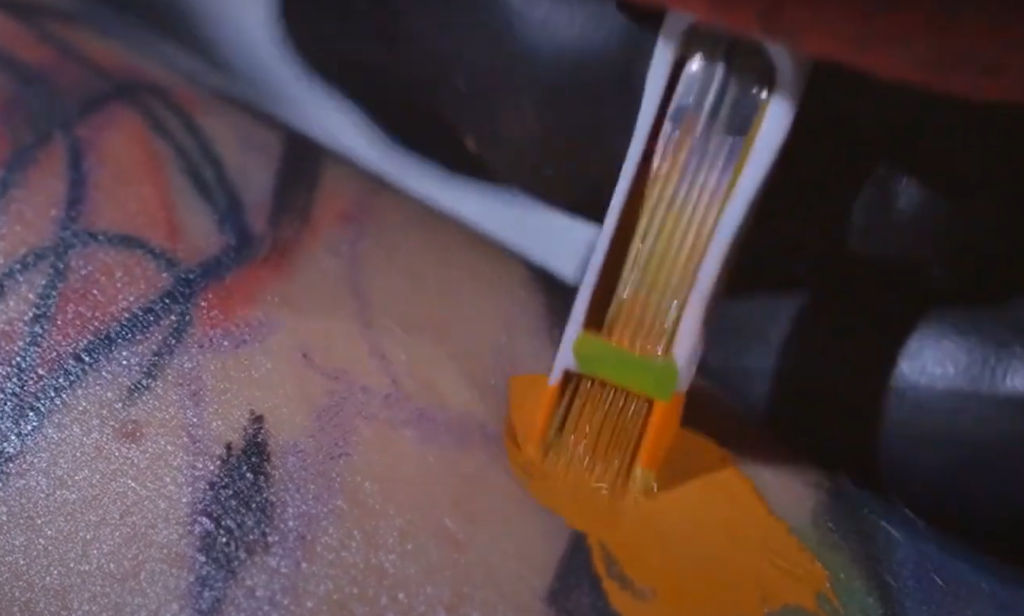
There are several reasons that can cause bruising from tattoos.
Note, however, that not everyone bruises after getting a tattoo. Some are simply more prone to them than others due to various factors. Here is some of them:
Location of the tattoo
Some parts of the body are more prone to bruising than others. This is usually related to the amount of flesh at the surface of the skin and how much tension this area has. This is very similar to swelling, as the same areas that are prone to swelling are also prone to bruising.
Where are these areas? Here are a few:
- your lower extremities, as upward blood flow may slow down;
- Ankles, wrists, and other joints because they move a lot, which puts more pressure on the injured area;
- Areas of the body where the skin is thin, such as around the eyes. The skin around the eyes is very stretched, thin and delicate, so it is easy to damage it.
Tattoo artist processing
In many cases, bruising is due to the way tattoo artists handle their machines and the tattoo machines themselves. The heavy hands of the master can really harm the skin of the client, and this is very sad. That is why, when looking for the right tattoo artist, you should pay attention to such details.
The cause of bruising can also be the way the tattoo machine beats. Some of these devices can be too powerful, which in the hands of an inexperienced master will be quite difficult to control. This will put your skin at risk.
Skin sensitivity
Some people are prone to bruising more easily than others. Older people, those taking certain medications, and people with certain medical conditions tend to bruise more easily than others. So if you fall into any of these categories, expect bruising after the procedure.
Questions about bruising from tattoos
Learn more about tattoo bruising with our answers to some of the most frequently asked questions about the condition. Check them out below.
How long does a tattoo bruise last?
Bruising from tattoos should gradually fade over the first week of your new ink’s healing process. However, since we don’t heal at the same rate, some people may take longer to heal. However, it certainly should not last a month.
Does ice help with tattoo bruises?
Yes, applying ice to a bruised area can speed up the healing process because it restricts blood flow to the area. However, be careful not to wet the new ink to avoid other complications.
Should I be concerned about bruising around my tattoo?
Not necessary. As mentioned above, bruising is normal and should go away as the tattoo heals. However, if the bruise does not disappear for a long time, it is better to seek medical help or a tattoo artist, in case it is a bruise and not a bruise. [3]
What should I do before getting a tattoo?
Before getting a tattoo, it is important to do your research. This includes finding a reputable tattoo artist who has experience doing the type of tattoo you want. In addition, you should make sure you are aware of the risks involved and have considered all of your options.
Pay attention to the main recommendations to make your stay in the tattoo parlor comfortable.
Clothing
The main rule is to wear what you don’t mind. Vaseline and special tattoo ink do not wash off.
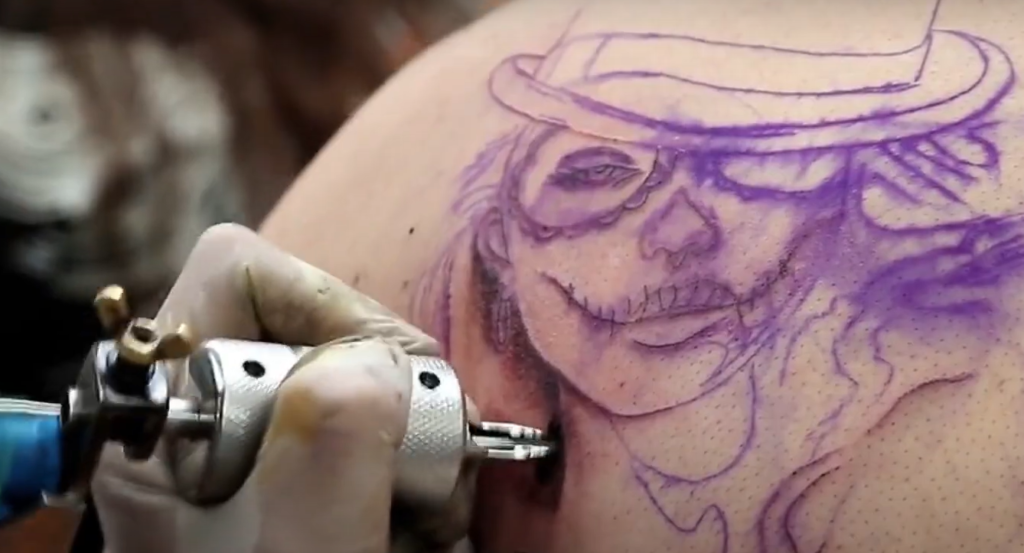
You will have to be in a fixed position for a long time, so choose things that are as comfortable for the body as possible.
An important requirement is that clothing should not rub the place of work just completed and put a lot of pressure on the skin. If the tattoo is performed on the lower back, come to the session in pants or a skirt with a soft elastic band. If on the back of the foot – in comfortable and well-worn sneakers.
Food
For a long session, it makes sense to bring a snack with you. At some point, you will get hungry, tired of sitting in a motionless position, or it will become difficult for you to endure pain. In this case, you can always ask the master to stop work and take a break.
Daily routine and activities
In this sense, there are no restrictions. Live as usual: work, visit sports clubs, sauna, swimming pool.
On the day of the tattoo session, it is advisable to sleep well and eat well. Give preference to complex carbohydrates – they will give strength and energy. In a state of fatigue, it is much more difficult to endure pain, and it will be difficult for the master to concentrate on work if the client is nervous, complains and counts the minutes until the end of the session. Drink more water – about two liters a day. Moisturized skin absorbs the color much better.
Hygiene
Before leaving the house, be sure to take a shower, or better – a hot bath with aroma foam. This will lift your spirits and help you calm down if you’re nervous. If there is hair growing in the area under the tattoo, carefully remove it with a new machine.
Medicines
Before and after a tattoo session, you can take most medications, including tranquilizers. It is necessary to exclude the use of alcohol-containing and vasodilating drugs. The latter often provokes severe bleeding during the session, and the master will often have to wash the blood, which can negatively affect the result. Coffee and energy drinks also dilate blood vessels.
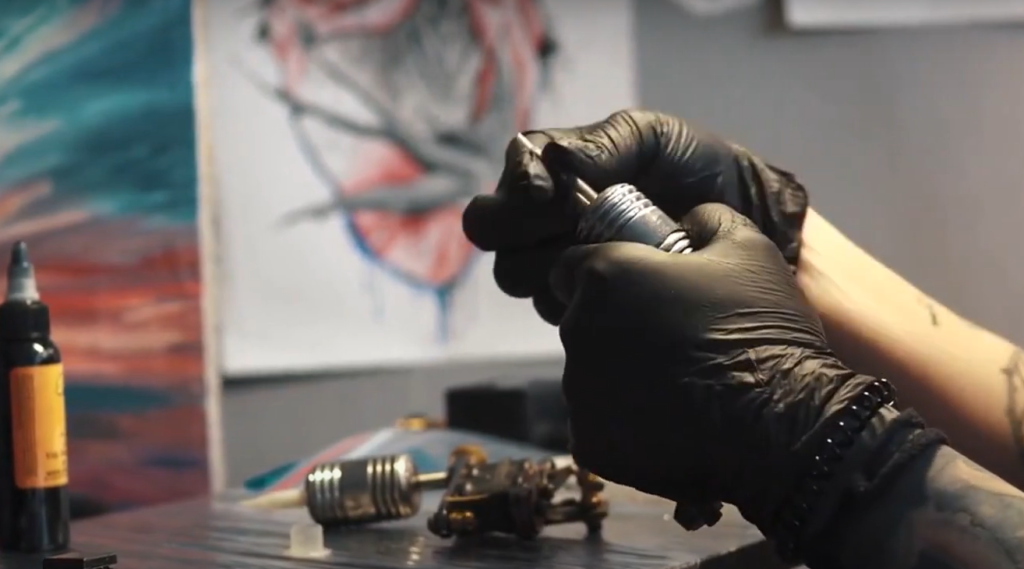
Immediately after the tattoo session, you can take an anesthetic anti-inflammatory drug inside.
Such drugs adversely affect normal blood clotting. Their use can cause the opposite effect – increase pain, provoke swelling, local bleeding and significantly prolong the healing time. Aesthetic defects are also not uncommon in these cases – after healing, annoying gaps remain in the drawing that need to be corrected. [4]FAQ
Can you tattoo color over black?
Yes, you can tattoo color over black. However, it is important to note that the color will not be as vibrant as it would be on healthy skin. In addition, the tattoo may not heal properly or may even become infected. If you are considering tattooing over a bruise, it is important to consult with a professional tattoo artist beforehand to discuss the risks and potential complications involved. [5]
What is the white out technique tattoo?
The white out technique is a tattooing method in which the artist uses white ink to cover up an existing tattoo. This can be done for various reasons, such as to lighten a dark tattoo or to cover up a mistake. The white out technique is more likely to succeed on darker skin tones.
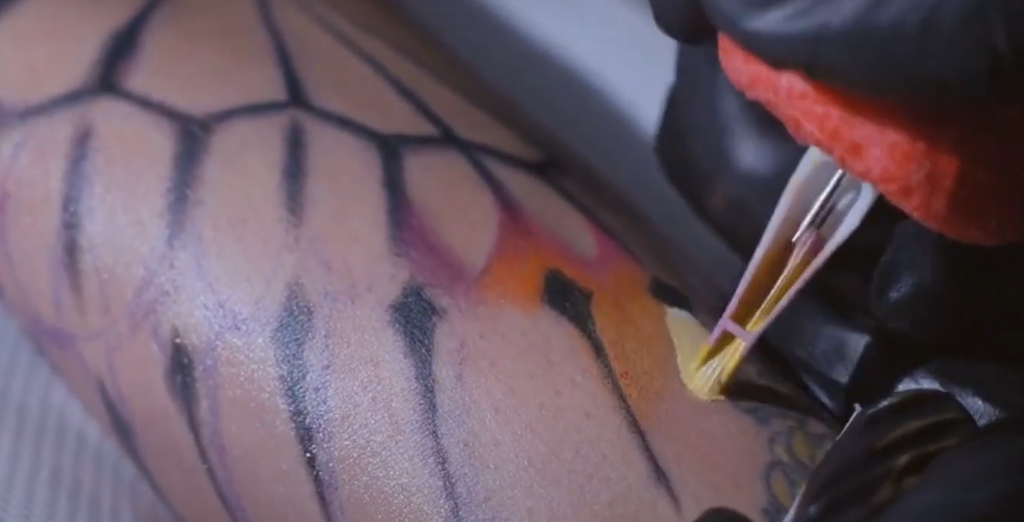
If you are considering using this method to cover up a bruise, it is important to consult with a professional tattoo artist beforehand. [6]
Do tattoos look darker when first done?
Yes, tattoos often look darker when first done. This is because the ink is still settling into the skin. The tattoo will lighten over time as the top layer of skin sheds. If you are concerned about the darkness of your tattoo, you can consult with your tattoo artist for their opinion.
Useful Video: Can a Tattoo Artist Tattoo Over a Bruise?
Conclusion
The answer to the question of whether or not you can tattoo over a bruise is yes, but there are some things you need to keep in mind. In general, it’s best to wait until the bruise has healed before getting a new tattoo. If you do decide to go ahead and get inked while the old one is still healing, make sure that your artist knows about the injury and takes precautions when creating your new design. With a little bit of extra care and caution, you can safely add another beautiful work of art to your skin! Have you ever had a tattoo over a bruise? Tell us about it in the comments below.
References:
- https://adrenalinestudios.com/can-get-tattoo-bruise/
- https://authoritytattoo.com/tattoo-over-bruise/
- https://www.lastsparrowtattoo.com/forum/t/6716-tattooing-on-an-existing-bruise/
- https://playhousetattoos.com/how-to-prepare-for-a-tattoo-appointment/
- https://adrenalinestudios.com/can-you-tattoo-over-black-ink/
- https://www.tattoodo.com/articles/white-ink-over-blackwork-tattoos-4523


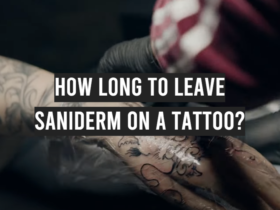
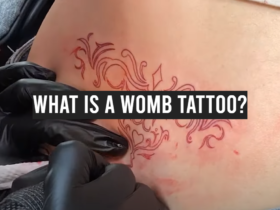

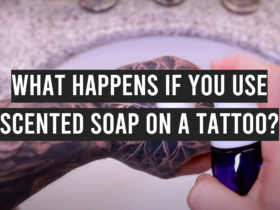
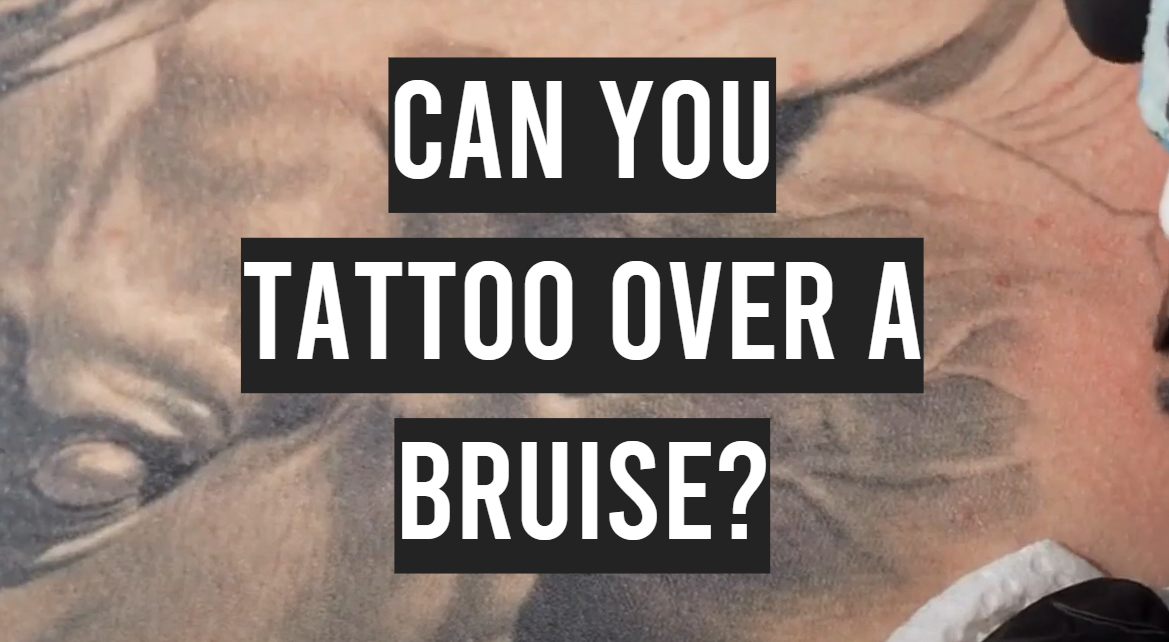

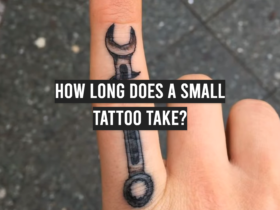
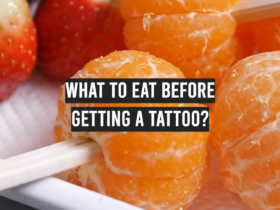
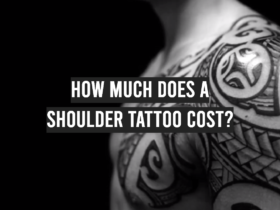
Leave a Review